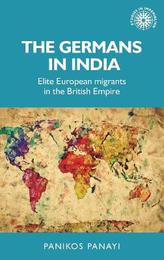
|
The Germans in India: Elite European Migrants in the British Empire
Hardback
Main Details
| Title |
The Germans in India: Elite European Migrants in the British Empire
|
| Authors and Contributors |
By (author) Panikos Panayi
|
| Series | Studies in Imperialism |
|---|
| Physical Properties |
| Format:Hardback | | Pages:312 | | Dimensions(mm): Height 234,Width 156 |
|
| Category/Genre | Colonialism and imperialism |
|---|
| ISBN/Barcode |
9781526119339
|
| Classifications | Dewey:304.854043 |
|---|
| Audience | | General | | Tertiary Education (US: College) | | Professional & Vocational | |
|---|
| Illustrations |
5 Maps
|
|
Publishing Details |
| Publisher |
Manchester University Press
|
| Imprint |
Manchester University Press
|
| Publication Date |
4 October 2017 |
| Publication Country |
United Kingdom
|
Description
Based on years of research in libraries and archives in England, Germany, India and Switzerland, this book offers a new interpretation of global migration from the early nineteenth until the early twentieth century. Rather than focusing upon the mass transatlantic migration or the movement of Britons towards British colonies, it examines the elite German migrants who progressed to India, especially missionaries, scholars and scientists, businessmen and travellers. The story told here questions, for the first time, the concept of Europeans in India. Previous scholarship has ignored any national variations in the presence of white people in India, viewing them either as part of a ruling elite or, more recently, white subalterns. The German elites undermine these conceptions. They developed into distinct groups before 1914, especially in the missionary compound, but faced marginalisation and expulsion during the First World War. -- .
Author Biography
Panikos Panayi is Professor of European History at De Montfort University -- .
Reviews'The intellectual and personal histories of German refugees and internment camps reveal a fascinating history of exile, suffering, and trauma that is simultaneously marked by resilience, survival, and creativity. It is here that the role of subaltern memories and archives can and should be brought into conversation with the current narrative, as the elites and subaltern were also put together in the internment camps. While marginal, subaltern actors play an important role. Although not enshrined in archives, they too shape histories in ways that need to be mapped when we are writing histories of entanglements and globalization. Indeed, subalterns are the first actors who migrate under the pulls and pressures of globalization as migrant labour and refugees. In fact, the rich archival material and Panayi's meticulous research direct our attention to such possibilities. In conclusion, Panayi's Germans in India is a valuable addition to our existing knowledge of connected Indo-German histories even as it suggests new avenues to explore.' Razak Khan, German Historical Institute London Bulletin Vol. XL, No. 2, Nov 2018 'In six chapters Panayi weaves a complex narrative of the histories of highly educated elite actors, most notably missionaries, travellers, and scholars. He uses rich archival material gleaned from institutional missionary and colonial state archives as well as personal accounts left in the form of autobiographies, travel documents, memoirs, and other ego documents...The intellectual and personal histories of German refugees and internment camps reveal a fascinating history of exile, suffering, and trauma that is simultaneously marked by resilience, survival, and creativity.' Razak Khan, German Historical Institute London Bulletin, Vol XL (2018), 2 -- .
|